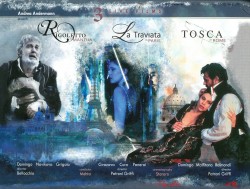 Andrea Andermann presents 3 Live Films: Rigoletto in Mantua; La Traviata in Paris; Tosca in Rome
Andrea Andermann presents 3 Live Films: Rigoletto in Mantua; La Traviata in Paris; Tosca in Rome
Various Artists; Orchestra Sinfonica Nazionale RAI; Zubin Mehta
Rada Film Production 2.110374-77
Firstly a large marquee credit must go to Andrea Andermann who produced these three made-for-television films of Verdi’s Rigoletto and La Traviata, and Puccini’s Tosca. Dreaming big with an uncompromising attention to detail Andermann brought together the finest production team, found classic locales and a stellar cast featuring Placido Domingo, Julia Novikova, Eteri Gvazava, Catherine Malfitano, and of course, the great Zubin Mehta to conduct and a legend, Vittorio Storaro to film it all. Still, one must also confess to wondering how on earth the producer, and directors Marco Bellocchio (Rigoletto) and G.P. Griffi (Traviata and Tosca) were going to make the grandeur of design and scale work for the small screen. More than anything the solution came in the form and miracle of Storaro for it is the cinematographer who made the grandeur of locations look equally grand for television – and therefore DVD as well. His use of lighting to bring lifelike proportion to characters on screen was no less extraordinary as was his ability to make long shots and big close-ups leap out at you.
You absolutely cannot go wrong with perfect scores and librettos in the hands of Mehta, who brought all of this to life aided and abetted by superb (film) direction, casting and the creation of atmosphere so transcendent that it felt as if you had been teleported to the Italy of a time long gone by. And then there was the conjuring of Verdi in the Mantua of Rigoletto, and the Paris of the real Marie Duplessis, the fallen woman Violetta Valery of La Traviata.
In both cases the intense melodrama of Verdi’s works becomes the very epitome of the word “operatic” as he addresses themes of love, betrayal, violence, power and death. Above all there is his genius for matching unforgettable melodies to moments of high drama that sustains his name even today. Of course there seems no one better suited than Domingo to play Rigoletto despite having to sing well below his preferred tenor range, for Verdi cast his principal character here as a baritone. Domingo pulls it off with aplomb. Still he is almost completely upstaged by the pristine soprano of Novikova. A more perfect Gilda there will not be in this lifetime nor is there likely to be a La donna è mobile as devastatingly wonderful as Vittorio Grigolo’s Duke of Mantua.
The music of La Traviata cannot be faulted although it flopped at its Venice premiere on March 6, 1853. And yet the opera – based on the life of Marie Duplessis, written by Alexander Dumas fils in La Dame aux Camélias (1852), grew to become one of the world’s favourite operas. Griffi’s film is just as lyrical and dramatic as the arias, including opera’s most famous brindisi, Libiamo ne’ lieti calici, sung here by José Cura (Alfredo Germont), Violetta’s lover. The extended duet between Violetta and Giorgio Germont and Violetta’s swooning last testament are perfectly nailed by Rolando Panerai and Eteri Gvazava.
Another casting coup appears in the form of Catherine Malfitano who plays the lead in Puccini’s memorable opera and appears to be as inspirational to Griffi in the role of Tosca as Sarah Bernhardt was said to have been for Puccini himself. Her fiery temperament that powers Act II as Tosca confronts Il Barone Scarpia (Ruggero Raimondi) as each uses sex as a weapon until Scarpia dies at her feet is the high point of the opera. Keeping pace with the action, Puccini’s orchestration is at its stormiest forever after as passion is substituted for poetry.



